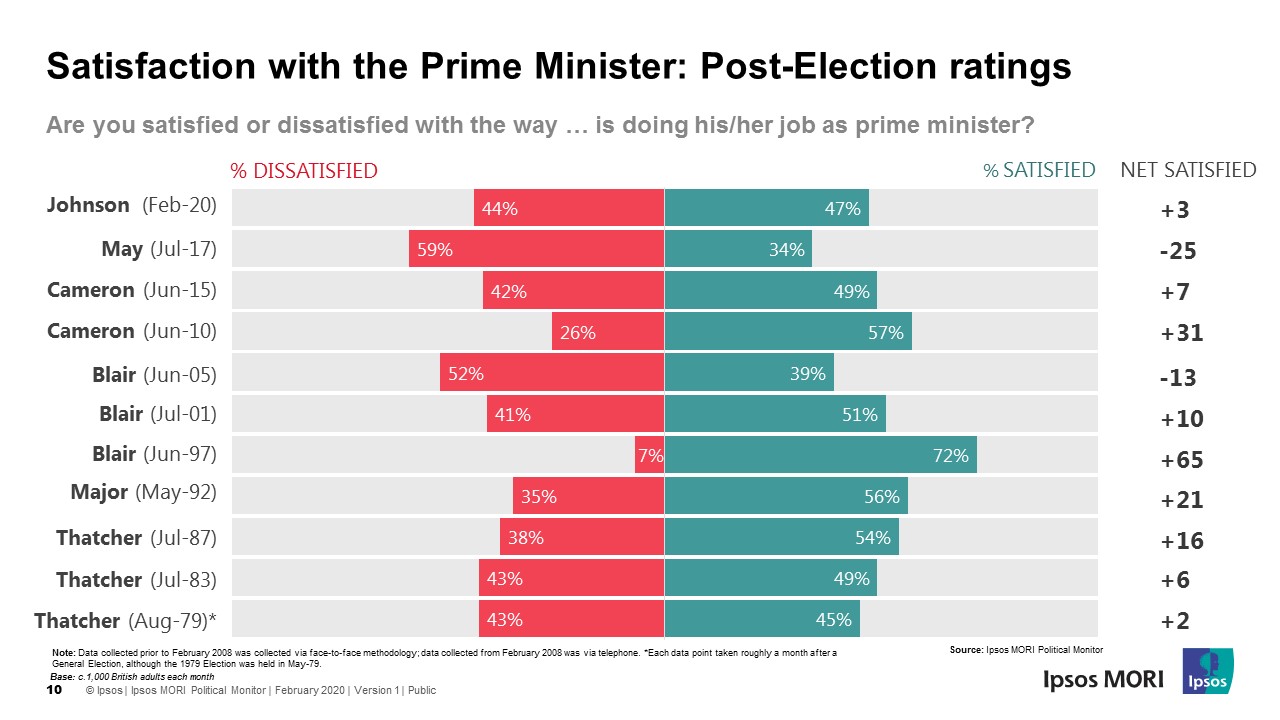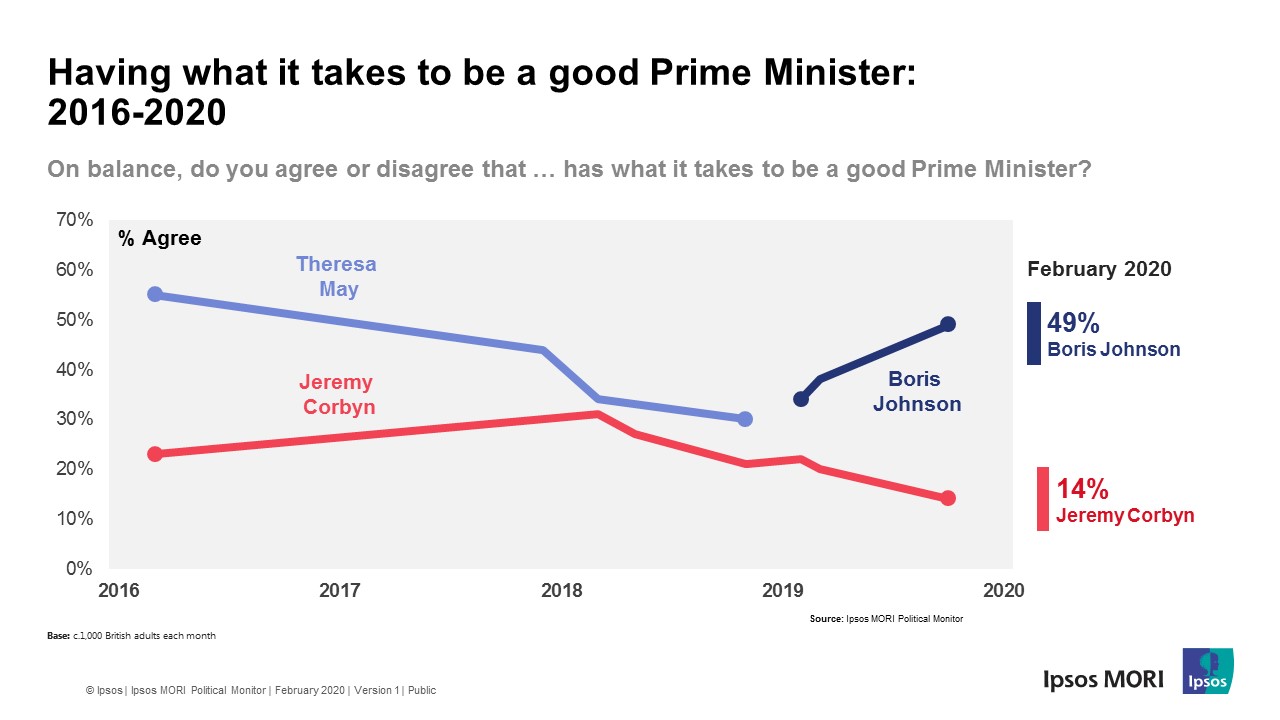Honeymoon for Johnson but despite improvements concerns remain about public services, economy and Brexit
- Boris Johnson sees a bounce in his leadership satisfaction ratings
- 44% think he has mostly got Brexit done, but only 15% think he has completely fulfilled his promise
- Hopes for the economy and public services improve but pessimists still outnumber optimists on the NHS, environment, opportunities for young people, the economy and the country as a whole
Our new Ipsos Political Monitor reveals Boris Johnson is enjoying a political honeymoon after his big election win in December although most believe there’s more work to be done to fully “get Brexit done”.
Nearly half (47%) say they are satisfied with the PM doing his job – an increase of 11 points since December just prior to the election while 44% say they are dissatisfied with him (down 12 points), giving him a net satisfaction score of +3. These satisfaction figures are better than his predecessor Theresa May after the 2017 election (34% satisfied), and similar to David Cameron post-2015 (49%), although worse than Mr Cameron after 2010 (57%). Going further back into Ipsos’s long-term trends, more are satisfied with Mr Johnson now than with Tony Blair after 2005 (when he had 39% satisfied), but Boris Johnson’s figures are worse than Tony Blair’s after 2001 (51%) and 1997 (72%), and also worse than John Major’s after 1992 (56%) and Margaret Thatcher’s after 1987 (54%).

Unsurprisingly Conservative supporters are overwhelmingly happy with him – 88% satisfied and 7% dissatisfied giving him a net score of +81. Satisfaction with the government has also seen a big increase from 23% in December to 40% now (50% dissatisfied) with a net satisfaction score of -10. Boris Johnson also sees a rise in the proportion who think he “has what it takes to be a good Prime Minister” from 38% in July to 49% now, his highest score since we started asking this of him in 2014. This is better than the scores Theresa May was receiving from 2018-19, although below her peak of 55% in 2016.

Soon-to-leave Labour leader Jeremy Corbyn meanwhile has lower satisfaction ratings since December with 16% satisfied with him (down from 24%) and 75% dissatisfied (up from 68%) giving him a net satisfaction score of -59. Among Labour supporters 30% are satisfied with him and 64% dissatisfied.
The Ipsos poll also shows:
- Economic optimism has increased this month with three in ten (29%) believing the economy will improve over the next year (up 8), 42% think it will get worse (down 8), giving an Economic Optimism Index of -13 (up 16 points) and the best score since April 2017.
- There is little optimism however that things overall will improve over the next year. A quarter (25%) think things will improve for the country overall (41% say it will get worse), and just 13% think things will improve for their local area (31% think it will get worse, 55% that things will stay the same). People are more split when it comes to them personally – a quarter (26%) think things will improve and another quarter (23%) say things will get worse, while half (50%) think things will stay the same.
- When it comes to public services and if they will improve over the next few years the NHS remains the public service people are most worried about – just under half (46%) think it will get worse over the next few years (31% think better). Britons are also worried about opportunities for young people (39% say worse vs, 34% better) and the quality of the environment (39% worse vs. 32% better).
- Looking at other public services the public are largely split. A quarter (24%) think the way their area is policed will get better over the next few years (22% say it will get worse), 28% say education will get better (27% worse), 29% say public transport will get better (30% say worse) and a third (33%) say skills in Britain’s workforce will get better (35% say worse).
- Optimism for all these public services though has improved and is better than has been seen for several years, particularly from low points in 2017-2018.
Lastly the Ipsos poll also asked people to what extent they think Boris Johnson has fulfilled his promise to “get Brexit done”. Less than half (44%) think the Prime Minister has at least mostly fulfilled his promise, and only 15% say he’s fulfilled it completely. More than a third (36%) say he has to some extent fulfilled his promise while 9% say he has hardly fulfilled and 8% say he has not fulfilled it at all. Conservatives are more positive with 68% saying he’s mostly fulfilled his promise (25% say he has completely fulfilled it).
Gideon Skinner, Head of Political Research at Ipsos, said:
There’s little doubt that Boris Johnson is enjoying a post-election honeymoon – satisfaction with his government and with him personally are up markedly, as is economic optimism and hopes for many public services from the low of the last few years. But although the Conservatives keep a strong lead in vote intentions, helped by Labour weakness, there is no room for complacency. Political honeymoons don’t always last, and overall pessimists still outnumber optimists, while concerns about the NHS, the environment and opportunities for young people haven’t gone away. And although it played an important part in his success, even his own supporters don’t think he’s completely put Brexit to bed yet.





